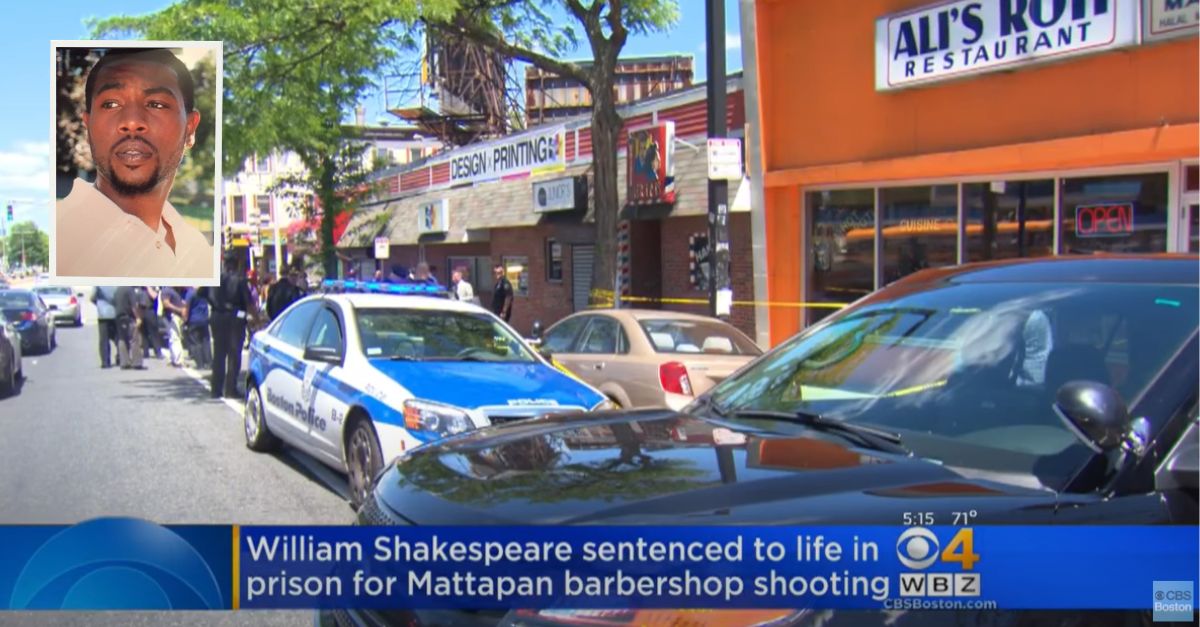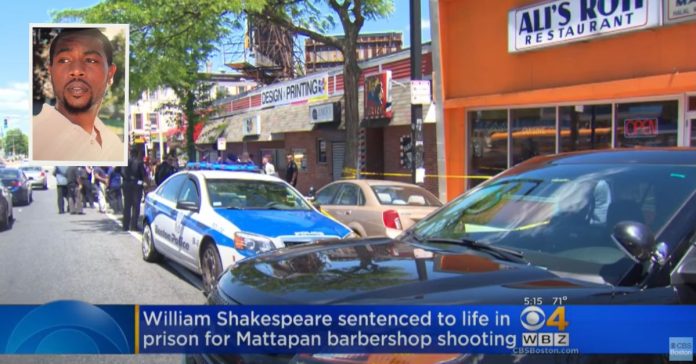The Massachusetts Supreme Judicial Court on Thursday tossed the murder conviction of a man named William Shakespeare and ordered a new trial.
While the noted playwright has been dead for over 400 years, 36-year-old William Omari Shakespeare was convicted of a 2016 murder outside a Boston barbershop.
Prosecutors with the Suffolk County District Attorney’s Office argued at trial that Shakespeare shot 31-year-old Marcus Hall to death after an argument shortly before 12:30 p.m. on June 14, 2016. Barbers said they heard a shouting match between the two, followed by gunshots.
Shakespeare’s attorneys pointed to another man — Mark Edwards — as the shooter.
Edwards testified before the grand jury, which led to Shakespeare’s indictment that he had been at the barbershop between 9 and 9:30 that day. But that was proved to be false by surveillance video from the barbershop, which showed he was in the back of the shop at the time of the shooting. Shakespeare’s attorneys never had a chance to confront Edwards about the contradiction at trial because he was murdered in 2017. The trial judge did not allow Edwards’ testimony to be presented at trial, citing hearsay.

William Shakespeare, convicted of murder in the June 2016 death of Marcus Hall, inset, at a Boston barbershop, had his conviction tossed by the Massachusetts high court. (Hall photo: Obituary; Scene image: WBZ/YouTube)
But the testimony should have been allowed, the high court said in a 66-page ruling. From the opinion:
It was error not to admit Edwards’s grand jury statements, particularly his testimony that he was at the shop between 9 A.M. and 9:30 A.M. and that he did not hear any gunshots when he left the shop. As the judge herself put it, “Edwards being a third[-]party culprit [was] very much alive in the case.” The Commonwealth conceded that he was present in the rear lot when the victim was shot, at around 12:19 P.M., and the shop video confirmed that he was in the shop just before the shooting occurred.
Therefore, his statements before the grand jury, which were contradicted by the shop video, could have been offered by the defendant as evidence of Edwards’s consciousness of guilt. It is of no matter, as was one of the judge’s concerns, that one cannot be sure that Edwards was lying, rather than “get[ting] the facts wrong.” Because this evidence fairly could support an inference that Edwards, the third-party culprit, lied about being present during the shooting, the defendant should have been able to introduce Edwards’s testimony.
Though the high court said prosecutors had sufficient evidence to prove Shakespeare’s guilt, it argued that when presented with this testimony, it could give a jury reasonable doubt about Shakespeare’s guilt. The testimony can be admitted on the retrial, it said. It can never be known why Edwards told the grand jury he was at the barbershop hours earlier, the high court noted.
“Where Edwards was at the center of the trial, we cannot say that this error was harmless beyond a reasonable doubt,” the opinion said.
The judge allowed Shakespeare’s attorneys other arguments that Edwards was the shooter. While blurry surveillance video did not clearly capture the actions of Shakespeare and Hall, it showed Edwards possibly holding a black object. Shakespeare’s attorneys argued it was a gun, but prosecutors said it was more likely milk cartons or something else in the foreground, and Edwards wasn’t holding anything.
Shakespeare’s attorneys said a witness came forward saying someone with the same nickname as Edwards dumped a bloody shirt after the shooting, but the shirt was never found. Edwards also deleted data on his cellphone before giving it to police and could not provide detectives the name of the person he was speaking on the phone with at the time of the shooting.
Hall had gone to the barbershop with his then-4-year-old son, and while they were inside, Shakespeare came in and asked to talk to Hall outside. The two, who knew each other, began arguing, but Hall went back into the barbershop while Shakespeare left. Shakespeare came back, and he and Hall again argued in the back lot. This time, prosecutors say Shakespeare pulled out a gun and fired several shots, striking Hall in the head and torso.
“Marcus Hall faced an armed gunman alone rather than put his son in danger by fleeing inside,” then-Suffolk County District Attorney Daniel F. Conley said in a news release after the sentencing. “His last act on this earth was to protect the child he loved.”
Shakespeare fled Boston and was arrested in New York City about seven months later. After the conviction, Shakespeare was sentenced to life in prison.
At the sentencing hearing, Hall’s family described him as a family man.
“Family meant everything to Marcus. He was our shining star,” Hall’s sister told the court, according to the prosecutor’s office. “I would like you to know that the violence in the city that made Marcus want to make a change is the same senseless act that was brought upon him. Marcus could have taught this defendant to be a better dad, husband, friend — only if he would have taken the time to use his mouth instead of a gun.”
A spokesman for the Suffolk County DA did not immediately respond to an email seeking comment.
Have a tip we should know? [email protected]

